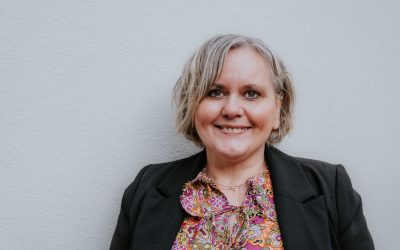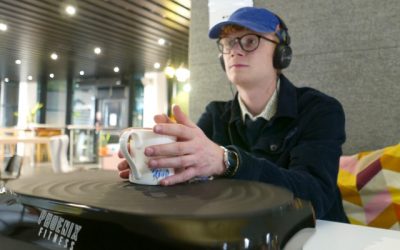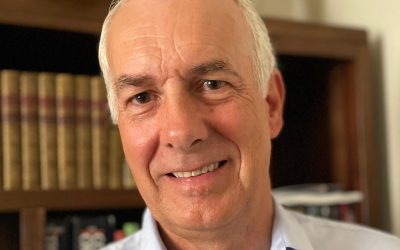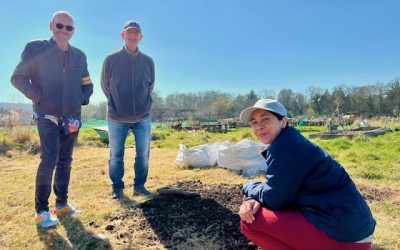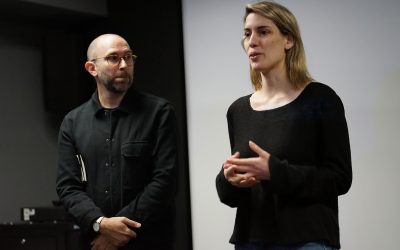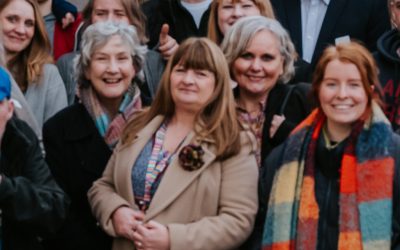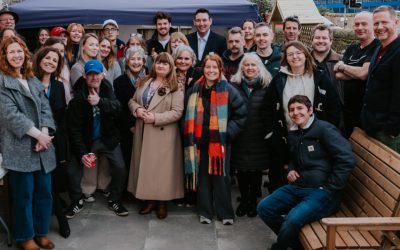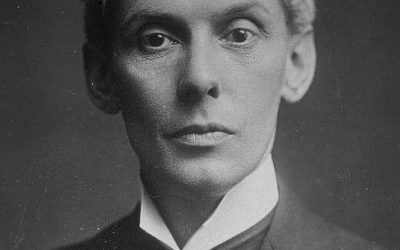News & Events
Forum Theatre company creates work based on Rowan Alba lived experiences
This innovative approach to exploring social issues behind homelessness will create a powerful piece of interactive theatre. But that’s only the beginning.
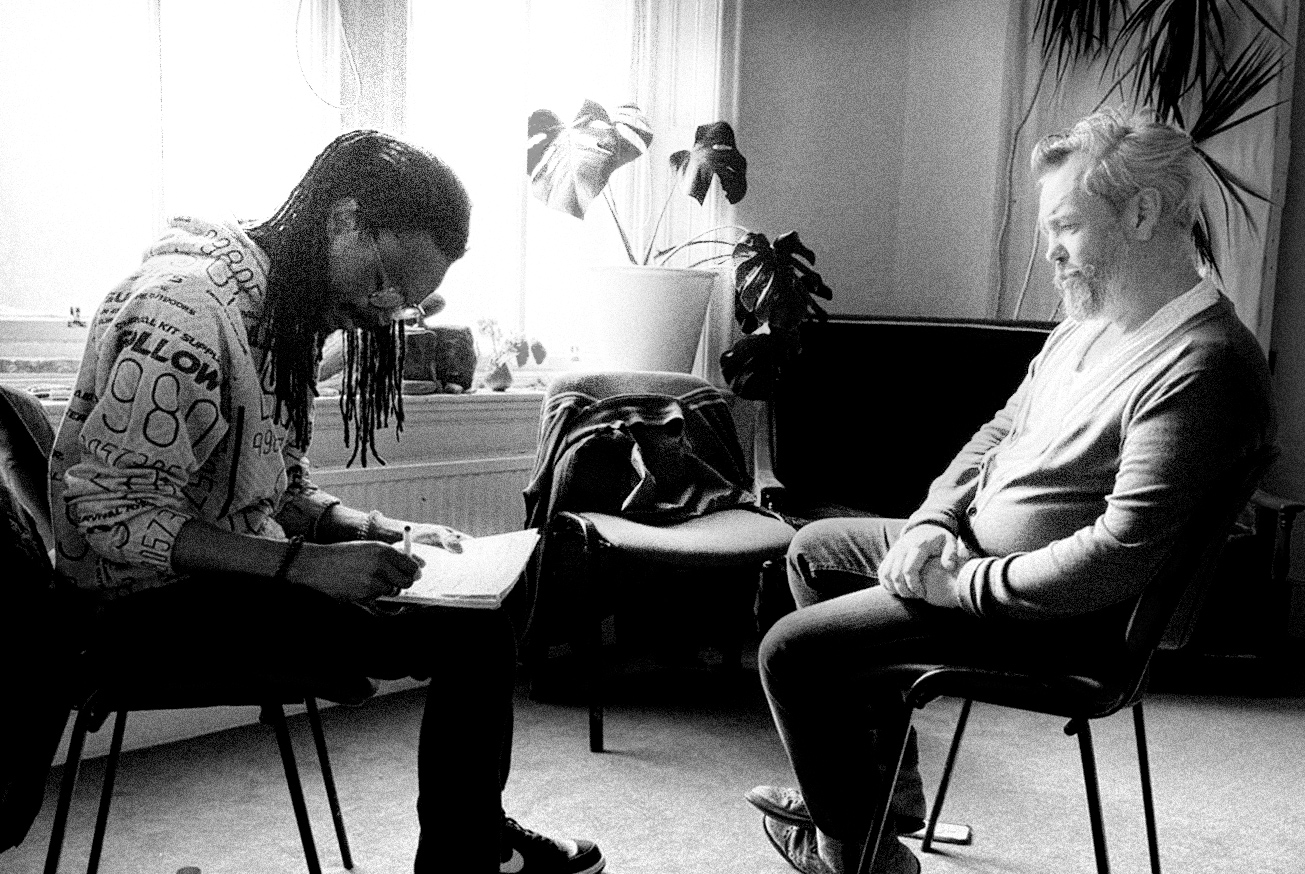
TO Scot Director of Hip Hop Education, Ace V!s!ion and Thorntree Mill staff member Angus Cochrane in a Theatre Workshop
A powerful new way to understand the roots of homelessness
When Rowan Alba’s Community Lead Tracey Stewart experienced the power of TO Scot’s Forum Theatre during the play, “The Footnote: Why would you say that?” she knew Rowan Alba had a story to tell about homelessness and social justice. This pilot project between the two innovative orgs aims to shed light on some uncomfortable truths about the homelessness sector and find new solutions along the way.
As the project gets underway we talked to Khaleda Noon, Creative Artistic Director of TO Scot about the background to her organisation and her goals for the production.
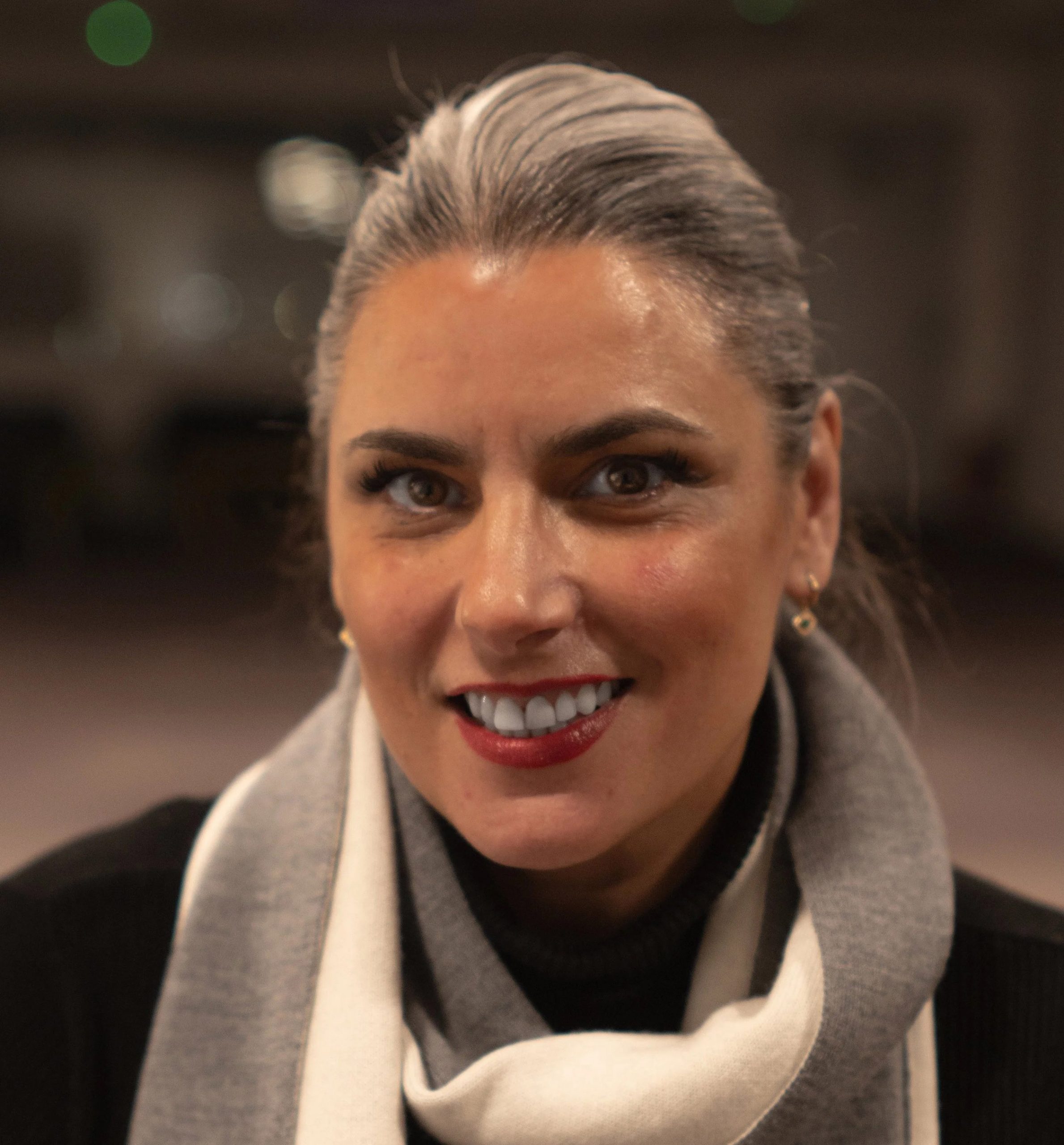
Khaleda Noon
Creative Artistic Director of Theatre of the Oppressed Scotland
VIDEO Introduction to Theatre of The Oppressed Scotland
What is TOSCOT and what does it do?
TO Scot is a global movement by Augusto Boal, who is an activist playwright from Brazil. T.O. stands for Theatre of the Oppressed and TO Scot is Scotland’s version of Theatre of the Oppressed. We are we focused on social issues, we’re not just a drama organisation. It’s not just about acting, it’s not just about drama. It’s about bringing drama to social issues where audiences can find solutions. It’s interactive, it’s playful, it’s exciting, it’s dynamic, and it’s for everyone to be involved with, not just the typical middle-class thespians. It’s for absolutely everyone. And that’s the main reason why this works, because it’s delivered and designed by those who have lived experience of social issues.
This is your first project about homelessness. How will you approach it?
I’ve not personally got lived experience of homelessness, but we are working with those that do. We want to engage them effectively and provide the tools to really express themselves in a safe, nurtured way where they can bring their lived experience to the table. We are able to navigate the issues in a way that allows for interventions during the performance. There is opportunities to change the narrative and find paths that change the ending. From there we find solutions together. That changes it from a negative situation to a positive situation.
A part of our approach is that we bring in trained actors to work with the non-actors. And that’s the magic of Theatre of the Oppressed. It’s for it’s for actors and non-actors. And that’s where the real magic happens. This approach must be given enough time for it to be safe and for us to develop trust in a way that doesn’t feel rushed.
“From the first moment of the performance I knew that this form of theatre could tell a powerful and important story about homelessness. But not just a one-sided conversation, through this experience we can explore new ideas and solutions for our staff and communities. This sector relies heavily on the good will, personal commitment and resilience of a stable staff team. We have to be sure we are not breaking some in the process of saving others. Their experiences must form part of the solution”
Tracey Stewart
Rowan Alba, Community Lead
How does the process of Forum Theatre shed light on issues affecting disadvantaged groups?
We do things a little bit differently. We bring creativity into it. A part of what we do is something we call Hip Hop Education. It brings a focus on people’s individual, unique talents. Each performance will try to bring something a wee bit unique into it, making it more exciting than just a play. It has to have, exciting parts where people can really explore their different talents.
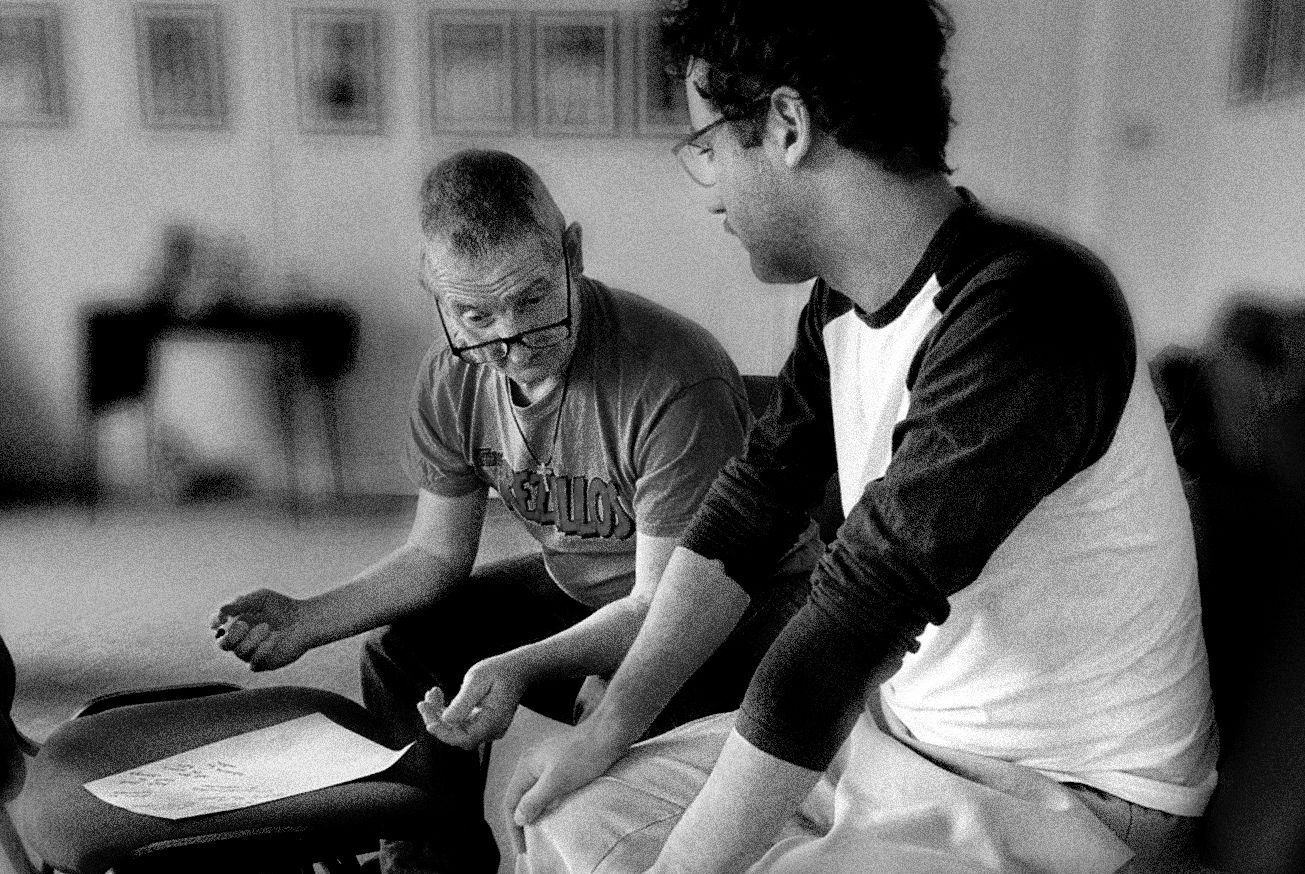
Actor Aaron and Rowan Alba staff member Andrew Shaw work share ideas during a theatre workshop
The beauty of forum theatre is that it’s by the community and for the community. Although we’ve got actors, we have also got people with experience from within the community as well.
That makes it easy to bring in lots of issues that everybody’s experiencing. Mapping that out in a safe, nurtured way where everybody feels they’re able to contribute. It’s not that they’re oversharing with people that don’t understand the challenges of oppressed groups. Obviously most people that we’ve worked with have never contributed to a mini play. For example, we are working with a women’s prison. We acted out this little bit of scene and we had some of the women change the narrative of the scene with just a few words. They contributed to a theatre production, even though it’s small, they contributed. The sense of achievement when they leave that space is something that many people will ever experience. The feeling of achievement is huge for us too. When you’ve engaged with a woman who has probably gone through so much trauma and abuse and ended up in a prison the sense of achievement is huge. We’ve been able to give her the space and trust to act out something out. Even though if it’s just one pose, where she’s pointing and she’s got a mean face. For that moment she’s fully doing it. And then she sits down with a sense of prayer. When that happened I thought, “Wow, these women can act, but they’ve never, ever had the opportunity to be part of something”. That’s what acting can be.
I share some of those challenges in my background. I do have lived experience with poverty and being in a family with substance misuse. The communities that we’re from, we never get these opportunities. We’re surviving. We’re not thinking, “Oh yeah. I want to try drama. Oh yeah. I want to do an evening class. Oh yeah. I want to do this or that”. We don’t have those opportunities. And now these women are now getting that opportunity, and they’re thriving in it. And that’s the beauty of it.
What can audiences expect when they attend the performance piece?
They can expect to be challenged. They can expect to be made to feel uncomfortable. They can expect a good standard of theatre. They can expect to have to think deeply about social issues. They’ll be able to step into the shoes of the oppressed, because they have to find the solution. They have to stand in their shoes and say, right, how can I make this different? How can I change this? They’ll feel the feelings that that some of us have to go through in daily life. But they can expect to be entertained as well. They’ll be blown away by the talent of these actors and non-actors.
What does the future of the partnership between TOSCOT and Rowan Alba look like?
The future the partnership could be something quite extraordinary. Whether it’s with the service users, whether it’s the staff or whether it’s the management. It could be working directly with the residents, training the members of staff, team building, problem solving within the whole staff team. We could feed into external things like legislation or development and internal things like strategy for the organisation. In an ongoing way, we can highlight current issues within the various Rowan Alba communities. The opportunities are endless, really.
We also offer proper anti racist training / anti oppression training. That can be applied to issues around LGBT, poverty, classism, racism, Disability Justice, these are all areas that we can we can tap into, and do it in a way that’s everyone’s comfortable with, and it’s not boring. Our training is much more dynamic than your average training or staff development consultation.
Where would you like to see TOSCOT in 10 years time?
Because of where I am at right now in my career, I don’t really want to think that big. It’s up to people like Ace (Director of Hip Hop Education) and Maria (Director of Forum Theatre), to think about where they want to take it over the next 10 years. I personally, I don’t want to have ownership of a huge thing. I just want to keep it small for now. I just want us to have a place where we can engage with communities. A place for schools come to us and the young people get a daily release and can gain qualifications in creative arts through us. I’d like to see us continue to put on amazing stage productions that really focus on community development and social justice.
More about TO Scot
TOScot forms “popular theatre troupes” to collaborate with local communities where we develop and perform original, interactive plays inspired by real-life challenges—the daily struggles they encounter. The aim is to engage peers in theatrical problem-solving, which can serve as a catalyst for tangible social action. Engaging directly with students, we transform learning to improve education for children and young people by better understanding their educational, psychological and social development, as well as their experiences in their homes, neighbourhoods, communities and society. These experiences grow opportunities leading to personal development and social mobility.
You can find out more about TO Scot over on their website at https://www.toscot.co.uk/
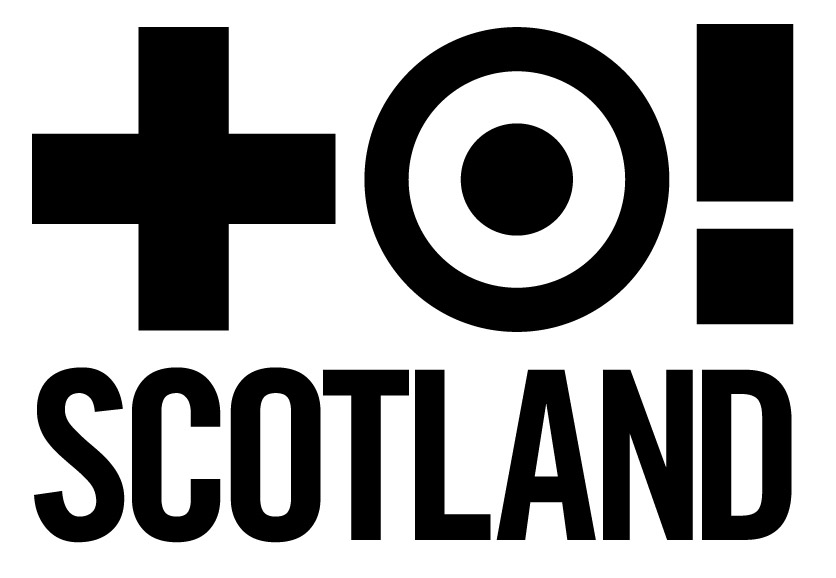
About us
Latest news
Rowan Alba CEO highlights three areas for urgent political action
Three urgent areas to address homelessness
Rowan Alba brings Mental Health Arts Festival event to Spaces
Self-Management at Spaces
Rowan Alba thanks Board Members and welcomes Calum Wilson as Chair
New Chair appointed
Community Allotment creates a place to grow in the city
A beautiful seed has been planted
Filmmakers capture daily life at Thorntree Street
Portrait of the community in our Leith accommodation service
Rowan Alba creates multimedia and interactive experiences to support self-management
Videos, audio and experiential activities support self-management
Karen Barr calls on Council to consider more than just housing
Edinburgh Housing Crisis
Community Photovoice expands across Rowan Alba services
Our Community Photovoice project expands to all services
Sidonie runs the Marathon for the women of Stramullion
Sidonie will be running the Marathon to raise funds for Stramullion
A word from our CEO
An update from Karen Barr, after 2 years as CEO
Supporting our community through embedded psychological support
Sarah Philips tells us about her work in our accommodation services
We celebrate 20 years of Ann Logan
Ann’s contribution to Rowan Alba’s services has been immeasurable
Addiction, chaos and hospital visits
CARDS staff member Michaela Devlin shares her experiences
CARDS work to end stigma of overlooked ARBD condition
ARBD is a result of alcohol abuse and is often misdiagnosed
Rowan Alba officially opens 9 new homes-for-life in Edinburgh
Thorntree Mill welcomes guests to celebrate launch
Plus ça change…100 years since the Addison Act on housing
The centenary of Council Housing (from 2019)

